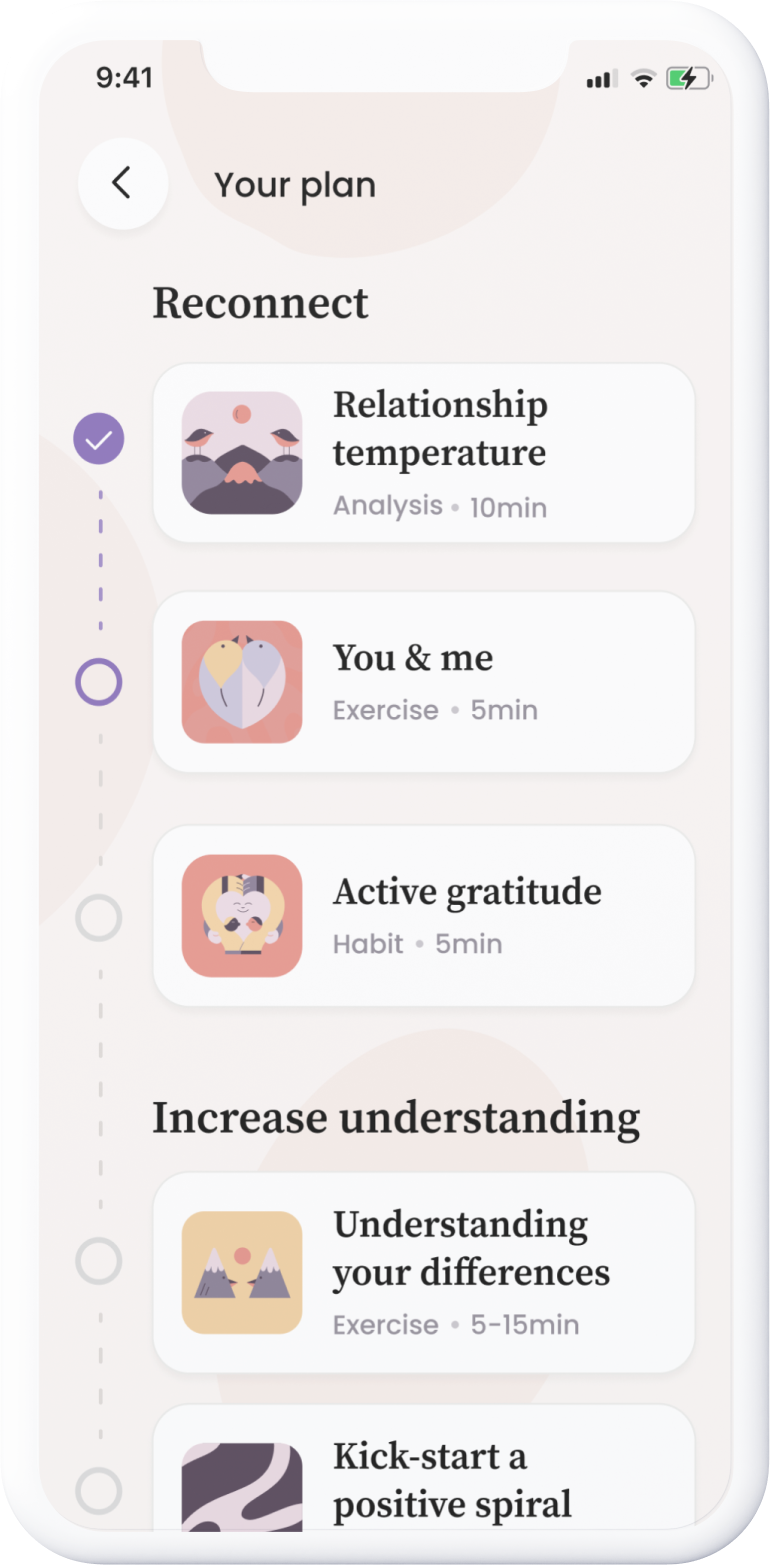Differences in Sexual Desire
How to Deal with the Common Challenge of Mismatched Libidos- 16 May 2024
- 8min

When one wants it more than the other
Sexual desire is a fundamental aspect of most romantic relationships. However, when there is a difference in sexual desire between two individuals in a couple, it can become one of the most common challenges in a long-term relationship. This difference can have a significant impact on both partners and can lead to conflicts and feelings of frustration, shame, and rejection.
A typical conflict that can arise from different sexual desires is when one partner repeatedly initiates sexual activity and the other consistently declines. The partner with a higher libido may feel frustrated and rejected, while the partner with a lower libido may feel pressured and overwhelmed. This dynamic can create a cycle of negativity in the relationship, leading to decreased intimacy and feelings of distance.
Sam and Hannah's story
For Sam and Hannah, a couple in their early thirties, the divergent sexual desires have become a relentless source of conflict. Hannah is repeatedly declining Sam's advances, while Sam becomes increasingly frustrated and rejected.
"It's not that I don't love Sam or find him attractive," Hannah says. "But my own desire just doesn't align with his. There is too much going on in our life right now, and I feel pressured and overwhelmed by his constant initiation of sexual activity. It's become a source of stress for me, and it's taking a toll on our relationship."
The cycle of negativity can be suffocating, as each rejection carries the potential to deepen the rift between partners. Hannah expresses a longing for a deeper emotional connection, one that transcends the physical realm.
"I wish Sam could understand that my love for him is not solely dependent on our sexual interactions. I want him to see that my desire for emotional intimacy is just as important as his desire for physical intimacy."
On the other side of this struggle, Sam, though fueled by a high libido, experiences his own emotional turmoil.
"I can't help but feel unwanted and undesired," Sam shares. "I constantly question myself, wondering if there's something wrong with me or if I'm failing as a partner. The repeated rejections chip away at my self-esteem, and it's difficult to shake off that sense of inadequacy."
Spontaneous or responsive desire
Desire or pleasure - what comes first? It is important to note that people experience sexual desire, or libido, in different ways. Some people experience spontaneous desire, which means they feel an urge for sexual activity without any particular trigger. Others experience responsive desire.
Unlike spontaneous desire, responsive desire blossoms when we feel pleasure. That pleasure could be sparked by a hot shower, a gentle caress, or the sensation of skin to skin contact. In this scenario, our desire is aroused by pleasurable activities, and the more pleasurable moments we experience, the more desire we feel.
Research shows that at group level, it’s more common for women to have a more responsive sexual desire, but there are also women who experience spontaneous desire and men who sexual desire is more responsive.
Creating a sex positive space
And, nota bene, to be able to feel pleasure, contextual factors are key. When you feel calm, content and confident, your brain will interpret almost anything with curiosity and interest – you will actually want to get closer to it (for example, to your partner).
In that context, it’s easy to arouse sexual desire and engage your libido. On the other hand, if you feel stressed, inadequate, or insecure, your brain will interpret almost everything as threatening or negative. Signals that would have sparked your desire in another context suddenly only irritate you or make you want to withdraw.
Do you see yourself in this explanation? For example, do you respond differently to your partner’s touch depending on your state of mind? A caress can be lovely, or not – if you’re annoyed with your partner or stressed about something important at work, maybe it’s actually more likely to make you feel... annoyed? Even angry?
Research clearly shows that in general, women are more sensitive to contextual factors when it comes to sexual desire, but also that women vary more among themselves in this respect.
The key to your desire and libido is to create a context in which your brain (and your partner’s) interprets the outside world as a lovely, safe and pleasurable place. One with room for sex. For most people, these boil down to low stress, high affection and high trust.
Tips for managing differences in sexual desires in a relationship
1. Communicate openly and honestly
Communication is key when it comes to managing differences in sexual desires. Partners should feel comfortable discussing their sexual needs and desires, as well as any challenges they may be experiencing. Creating an open and non-judgmental environment can help partners feel heard and understood.
2. Practice active listening
To managing differences in sexual desire, active listening is an important skill. Partners should make an effort to truly listen to each other's perspectives and understand their needs. This can help build empathy and understanding, which can lead to more productive conversations about sexual desire.
3. Explore non-sexual intimacy
Sexual desire is not the only way to express intimacy in a relationship. Partners can explore other forms of physical intimacy, such as cuddling, kissing, and holding hands, to build emotional and physical connection without the pressure of sexual activity.
4. Create a sex positive context
Or, in other words, make room for pleasure in your life. If you are the one who wants it more, think outside the box. Can you help your partner sleep better, become less stressed, or just feel better overall? For most people stress hormones kill the sex hormones. Maybe there are dishes you can wash, a weekly menu you can plan, or a living room floor you can vacuum?
5. Seek professional help
If differences in sexual desires are causing significant conflict in a relationship, it may be helpful to seek professional help. A couples therapist can provide guidance and support in addressing the issue and finding solutions that work for both partners.
With open communication, active listening, and a willingness to explore new solutions, partners can find ways to manage this challenge and build a stronger, more fulfilling relationship. It is important to remember that managing different sexual desires takes time, effort, and patience, and seeking professional help may be necessary in some cases.
There are a lot of things you can do on your own! Helga Johnsson Wennerdal and Clara Zelleroth are two licensed psychologists, specialised in Integrative Behavioral Couple Therapy (IBCT). In their app Ally you will find relationship exercises, info and guidance on how to deepen your relationship and tackle challenges in your life together.








